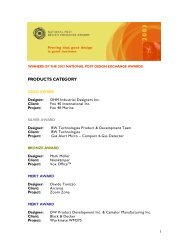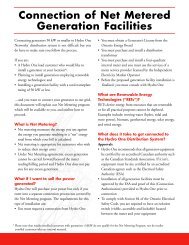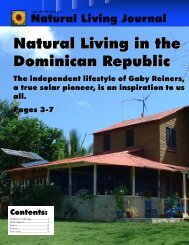Volume 3 - Program & Project Ideas (PDF - 4.5 - Natural Life Network
Volume 3 - Program & Project Ideas (PDF - 4.5 - Natural Life Network
Volume 3 - Program & Project Ideas (PDF - 4.5 - Natural Life Network
Create successful ePaper yourself
Turn your PDF publications into a flip-book with our unique Google optimized e-Paper software.
<strong>Natural</strong> Resources Canada – Community Energy Systems<br />
• Parking management strategies around transit minimize costs and support<br />
transit oriented development, saving energy costs and CO2 emissions.<br />
Source: TDM Encyclopedia. For more information, contact www.tri-met.org.<br />
-Additional resources<br />
TDM Encyclopedia, chapter entitled, Parking Management: Strategies for More Efficient<br />
Use of Parking Resources http://www.vtpi.org/tdm/tdm28.htm#_Toc42574727<br />
T.1.4 Reduce employee parking<br />
- Case study: Victoria, BC<br />
The developer of the Vancouver Island Technology Park negotiated a reduction in<br />
municipal parking requirements by 50 per cent. Through discussions with the public<br />
transit agency, the developer arranged for city buses to pass in front of the buildings. In<br />
exchange, the developer paid for and built adequate road access for the buses. Overall<br />
the developer saved money because the additional road expansion expense was offset by<br />
the reduced parking space expense. The developer also provided bicycle parking,<br />
showers, and parking for car sharing vehicles.<br />
• Energy is saved because more people will use public transit, cycle or car pool<br />
rather than drive by themselves.<br />
• Workers may also choose to work in the park because of the increased<br />
transportation options.<br />
The Vancouver Island Technology Park is the first project in Canada to achieve Gold<br />
certification under the U.S. Green Building Council's Leadership in Energy &<br />
Environmental Design (LEED) Rating System. It has also a BOMA Earth Award<br />
(sponsored by BC Hydro PowerSmart), and many others.<br />
For additional information, contact Alex Zimmerman, Canada Green Building Council Tel.:<br />
(250) 483-3242. E-mail: azimmerman@cagbc.org or see LEED case study<br />
http://www.usgbc.org/Docs/Certified_<strong>Project</strong>s/0113VITPcaseStudy2.pdf<br />
T.1.5 Guaranteed ride home programs<br />
- Case study: San Luis Obispo County, CA, USA<br />
Ride-On, the transportation management association for San Luis Obispo County in<br />
Central California, offers door-to-door Guaranteed Ride Home service anywhere in the<br />
area on weekdays between 8:00 a.m. and 7:00 p.m. Employers can set up a Guaranteed<br />
Ride Home program to fit their needs. In the event of an emergency, authorized staff<br />
telephone Ride-On to request a Guaranteed Ride Home. The travel management<br />
association will send a vehicle within 15 minutes. This program is insurance against ever<br />
being at work without a car, to help increase rideshare commuting. The cost of the rides<br />
home range from $5 to $20 (US) depending on the distance traveled. Some businesses<br />
pay the fare for the actual ride or let the employee pay the fare. The Guaranteed Ride<br />
Home <strong>Program</strong> has proven to be a significant benefit for employees.<br />
• Reducing car use saves energy.<br />
Draft 4/11/2005 61






